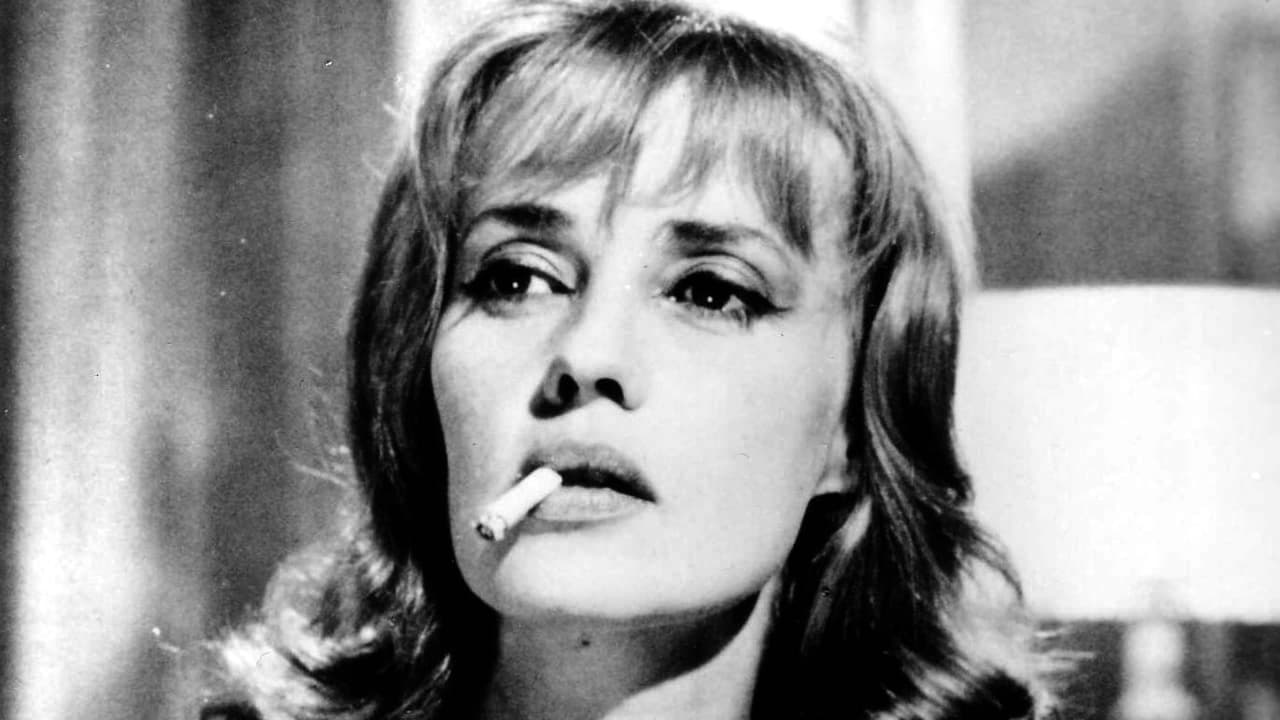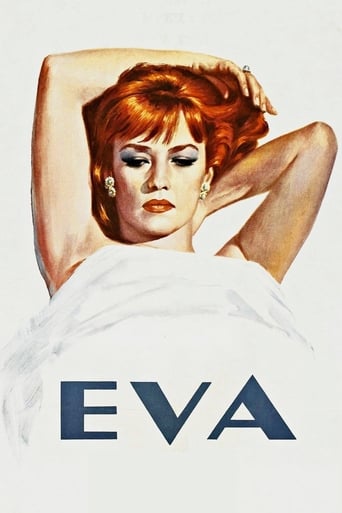AniInterview
Sorry, this movie sucks
Nonureva
Really Surprised!
Beystiman
It's fun, it's light, [but] it has a hard time when its tries to get heavy.
AutCuddly
Great movie! If you want to be entertained and have a few good laughs, see this movie. The music is also very good,
nadineacoury-44872
When it came out I was young and more a slave to movie fashion, I saw it again yesterday after more than 30 years and could not bear more than one hour, the movie is awfully false and pretentious and Jeanne Moreau is unbearably fake and untruthful
Slime-3
Two distinctly dislike-able characters circle one another amid the nicely photographed Venice and Rome locations; unable to break away, unable to be together it seems, but wrecking the lives of those around them. It's a promising scenario, a glamorous setting, a combination of strong cast, top name director and highly rated cinematographer. One could easily imagine Antonioni at the helm with Monica Vitti and Marcello Mastroianni as the stars. But it's not them and it really doesn't work. In the male lead role Stanley Baker is well cast as an out-of-place writer from the Welsh Valleys who's made it big with one book and now lives on an Island near Venice, the new darling of the in-crowd. He's big, bluff and rugged with undeniable presence and a convincing aura of potential violence. He isn't exactly nice to know, but you get the feeling that the right woman could bring him round. Virna Lisi as his fiancée is that woman. A Beautiful, fragile, extremely desirable character, she clearly loves him despite being well aware of his many flaws. So what on earth Baker's character finds in love-rival Eva is the huge stumbling over which this whole movie falls. Disbelief can only be suspended to a degree. Eva isn't the sort of woman to bring out the best in anyone. She's clearly supposed to be some kind of irresistible sexual predator who the ex coal miner cannot resist but she's portrayed as frankly repellent. A pouting, scornful, self obsessed gold-digger who plays off lovers against pretend-husbands. She treats Baker's character with taunting disdain at every turn and yet he follows her like an eager lap-dog. Her character might, just might, have worked if an actress of spectacular sexual allure had been cast. Instead Eva is played by Jeanne Moreau. She's a fine actress but she has nothing of the Machiavellian Femme Fatale that the role absolutely demands. Take a look at the poster/DVD sleeve photo of her with cigarette dangling from a sour, down-turned mouth. It's clear this is an actress who's screen persona is more Bette Davis than Brigit Bardot - more Rachael Roberts than Julie Christie. She plays the role with conviction but cannot communicate the essential level of sex-appeal to make the story work, even when the demure camera work teases us with extended near- views of her undressing(this is an early 60s film, so explicit it's never going to be, a lot of wardrobe doors and bath taps are strategically positioned) it all just looks more sordid than sexy. It's just not her role and no amount of beautifully filmed scenes of a wintry Venice, or glamorous parties, or stylised interiors or Alfa Romeo sports cars can overcome that. There is also some poor direction of the actors - of Baker in particular, who gets a bit too over- Shakespearian in his emoting at times (early on - the hand clawing at the face...no Stan, you were better than that, much better) and a few scenes which are simply too set-up to be plausible.In the end its not a film that holds the attention, the characters are too unsympathetic to feel any connection with and although there are moments of poetry , as a whole it's a plodding misfire. My apologies to all fans of Miss Moreau - no offence, very few actresses could have made this role work.
barbarella70
Truffaut muse Jeanne Moreau was one of the sexiest women in cinema. Her features were unnaturally glamorous: the dark eyes that registered anything but passivity, eyebrows always slightly furrowed, upturned mouth will full, sensuous lips. She's on fire here; thus, her Eva transcends this material. Miss Moreau fills every scene with a physicality that looks almost choreographed yet not rehearsed. She's raw carnality personified. Combining that quality with a careless self-consciousness make it easy for one to see what's missing in today's female actors. Louise Brooks had it. Jessica Lange had it in The Postman Always Rings Twice. But nobody else really. The film itself hasn't held up unless you're a film scholar or part of the intellectual art house crowd. Characters register pain by pressing a cheek against whatever wall comes their way and letting their jaw go slack. A myriad of sixties kitsch fill the screen: white masks, fur blankets, overdubbing, a jazz-scat score, and a fishtank image Mike Nichols must have borrowed for The Graduate. We even see a character face her obsession and say with fervor, "I love you! I love you! I love you!" while they have breakfast on a piazza. I've used the term 'dated' in other reviews and I'm beginning to frustrate myself. It's an easy buzzword (like co-dependent or brilliant); sometimes it has a place but mostly I find it insulting and the wrong word to use for Eva. But the film is intellectual camp.
davidholmesfr
Filmed in noir et blanc this is more noir than blanc. `Film gris' might be a better category. Venice in the winter with stormy waters, in more ways than one, provides the backdrop to this tale of two strong characters, Eve (Moreau) and Tyvian Jones (Baker). Neither character deserves, or gets, a shred of sympathy from us, she being a ruthless gold digger and the personification of evil, he a womanising writer who takes plagiarism to new heights (or depths).Despite this, the powerful interaction between them draws us in to their world as their doomed relationship develops. This development is far from straightforward, as one would expect with Losey directing a French/Italian production. Both main characters appear deaf to each other's needs or demands. The film starts more or less where it finishes but we do not get taken around a clear circle, rather we fly off at irregular tangents. Whilst not making for easy viewing it does, nevertheless, hold our attention.
Moreau is central and dominates every scene in which she appears. In truth when she's not on screen the film falls rather flat. I'm not convinced that casting Baker, whose expertise lay in hard man roles either military (`Zulu') or criminal (`Robbery'), was right. He just about got away with it as a university don in Losey's later film `Accident', but as a writer moving in artistic circles this may be a stretch too far. If a freebooting Welsh Lothario (in Dylan Thomas mode) was required just think what Richard Burton might have made of it!Watch out for a brief, but wonderful performance by James Villiers as a lugubrious, plummy screenplay writer. This is not a film for recalling the `funny bits' but I defy British viewers not to enjoy Moreau's last words in the whole film - `Bloody Welshman'. Not a term unheard in English, Scottish or Irish rugby circles – but coming from Jeanne Moreau? Hilarious and wonderful.The film is probably about 15 minutes too long – some of the scenes between the two main characters have elements of repetition and add little to the overall development. An interesting, if flawed, movie.

